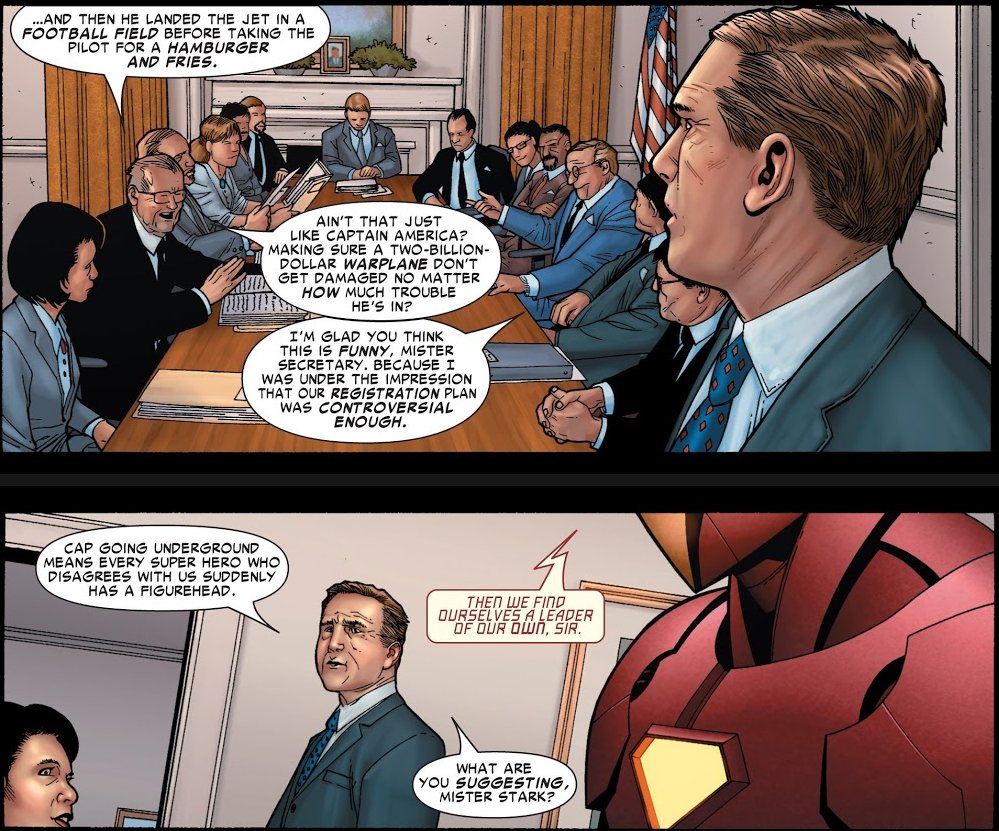The problem with the SHRA is that its an antithesis to the superhero genre.
Most of the heroes were inspired by a vacuum that existed in real-life society,
especially the Golden Age heroes. Superman was conceived
because Jerry Siegel's father, a store-owner, died during a store robbery. So he birthed into existence a being who was good, and just, and strong, and would have prevented such a tragedy from occurring. Batman rose from the popularity of such heroes as Zorro or Dick Tracy... who were popular because, in real-life, the Prohibition had resulted in the rise of organized crime, so a hero immune from cop and city official corruption, who fought for the people against such corruption, particularly in a large metro area, really appealed. Steve Rogers was created because America wasn't taking a stance against Hitler, we were in a state of isolationism and there were even a lot of Nazi sympathizers in the country and that made Jack Kirby and Joe Simon, both Jewish, understandably furious. If America wouldn't protect the Jewish against a mad-man, then they would create an America who would. Cap was a political protest. The Punisher rose out of the disillusionment of the Vietnam war, how soldiers had been drafted into a war very few supported and came back and put on the streets, riddled with PTSD, without so much as a thank you for your service from the country who had forced them into said service to begin with, and none of them received adequate treatment for the scars, both mental, and physical, the war had left on them.
The superhero genre revolves around the idea that the Earth needed special people with special powers beyond the capabilities of real-life governments or first responders, and, more importantly, beyond their rule book and political swaying. The creators were implying, some more subtly than others (and some not subtly at all), that sometimes those institutions weren't enough: not fast enough, not honest enough, not earnest enough, not strong enough, not ballsy enough, to be the hero the people need. Superheroes were an attempt to fill that void. That's the entire point of them. Making them a part of the institutions that Kirby, Simon, Siegel, Shuster, Kane, Finger and Conway were pointing out the flaws in is an antithesis to that intent.
Moreover, it's not as if the government in the MU has been portrayed as being trustworthy or honest or just enough to control what amounts to an army of drafted superpowered people at their beck and call. Currently in the MU Roxxon is doing what ever the heck they want, including helping Malekith invade Earth, not to mention human experimentation, and getting away with it (Immortal Hulk, Avengers, Invaders). And they have political backing and politicians in their pocket. A Roxxon representative was shown at a UN meeting. Fisk is the mayor of New York. In the Cap book, a group called the Power Elite, consisting of the Lukins (Alexander is possessed by Red Skull), the Watchdogs, Fisk, the Chadwicks are not only attempting to take over America via collusion, they also have the press in their pocket and are controlling that. So is Roxxon.
I had a very interesting conversation with a mutual on Twitter the other day that posited the following question: if the X-Men have given the US drugs that are supposed to cure multiple diseases and extend life, why is Aunt May sick and dying? And one of the conclusions we came to is that maybe the government is not actually distributing said drugs. Maybe they are hoarding them. Maybe this is a future plot point. We already know that Roxxon is on the verge of offering superpowers to whomever has the money to pay for it.
And then there's the fact that the US created the Squadron Supreme, and Russia revitalized the Winter Guard, all under the direction Mephisto, in order to rage a superhero war with Atlantis and the Avengers.
My point is that the world governments in the MU aren't exactly awesome (far, FAR from it), and since the SHRA was shown on panel as being the brainchild of the Bush administration (see below), this fact was true even back when Civil War came out, so the thought of these governments, and the US government in particular, having a registration that inscripts superpowered citizens is not... good (<- understatement).










 Reply With Quote
Reply With Quote